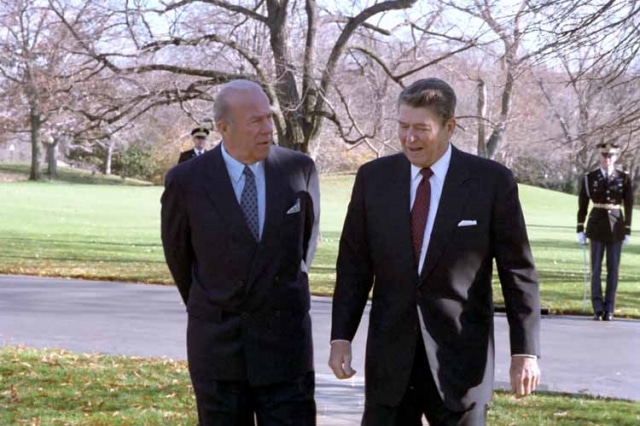George Shultz, who served as President Ronald Reagan’s Secretary of State from 1982 to 1989, is not only willing to buck the Republican Party’s orthodoxy on global warming by acknowledging climate science, he’s outright calling for action. And he’s even willing to walk the talk.
Shultz, a former University of Chicago economics professor and president of Bechtel, has installed solar panels on his house and drives an electric car around the Stanford University campus, where he’s a distinguished fellow at the Hoover Institution on War, Revolution, and Peace.
According to Bloomberg, Shultz’s climate awakening came when a retired Navy admiral showed him time-lapse footage of disappearing Arctic sea ice and “explained the implications for global stability.”
“The potential results are catastrophic,” Shultz says to his fellow Republicans. “So let’s take out an insurance policy.”
Shultz, who supports a tax on fossil fuels that would be used to pay “carbon dividend checks” to US citizens, was part of a bipartisan group that produced a report earlier this year on the economic risks of global warming called “Risky Business.” In commenting on the report, he spelled out what he means by calling for a climate change “insurance policy” a little more clearly:
The risks we take if the climate changes need to be identified carefully. We have done that here, in the spirit of creating an insurance policy. I support steps in that spirit, such as sustained support for and investments in innovation and resilience that put us in the best position to be prepared for all possible outcomes.
Shultz appears hopeful that the rest of his party will come around to acknowledging climate change as a clear and present threat to life on this planet. “Reality is going to do a lot,” he told Bloomberg. “It will become more and more evident that there are big melts all over the world that are going to cause water problems and other problems. People will have to notice.”
It’s not especially surprising that Shultz came to realize the urgency of the climate crisis after speaking with a former member of the U.S. military.
In October, three retired military leaders—General Anthony Zinni of the U.S. Marine Corps, General Ron Keys of the U.S. Air Force, and Admiral Frank Bowman of the U.S. Navy—penned an op-ed in Stars and Stripes to emphasize the need for the armed forces to better prepare for the impacts of global warming: “Today, as we pass another global heat record, we run the risk of being too late on climate change, endlessly debating causes at the expense of sensible actions.”
The Stars and Stripes op-ed came in response to the release of the Department of Defense’s 2014 Climate Change Adaptation Roadmap, which found that climate change “poses immediate risks to U.S. national security” and lists the risks in stark terms:
Rising global temperatures, changing precipitation patterns, climbing sea levels, and more extreme weather events will intensify the challenges of global instability, hunger, poverty, and conflict. They will likely lead to food and water shortages, pandemic disease, disputes over refugees and resources, and destruction by natural disasters in regions across the globe.
In our defense strategy, we refer to climate change as a “threat multiplier” because it has the potential to exacerbate many of the challenges we are dealing with today – from infectious disease to terrorism. We are already beginning to see some of these impacts.
Image Credit: President Reagan walking with George Shultz outside the Oval Office December 4, 1986 via Wikimedia Commons / Ronald Reagan Presidential Library, National Archives and Records Administration
Subscribe to our newsletter
Stay up to date with DeSmog news and alerts






